Camp Modin, a Jewish overnight camp in Belgrade, Maine, has received a great deal of attention in recent weeks for being one of the few Jewish overnight camps to open this summer amid the worldwide coronavirus pandemic. Just two weeks before its start, owners/directors Howard and Lisa Salzberg, and assistant director Samara Lender posted on the camp website: “After 1,700 collective tests, we are excited to say that our entire population has tested negative. The kids are having the best time, and it is an honor and a privilege to provide our campers with a taste of ‘normal’ in such challenging times.”
Modin has been providing recreational, social and Jewish camp experiences during both normal and challenging times for nearly 100 years. In fact, this is Modin’s 99th season. The day camp ends on Aug. 12, and then Modin starts preparations for its 100th year in operation with festivities lasting from Aug. 13 and continuing through the end of summer 2021.
Coincidentally, the idea for Modin was proposed in the winter of 1921—just a year after another pandemic had finally ended. The Spanish flu, also known as the 1918 flu pandemic, lasted from February 1918 to April 1920, infecting and killing millions around the world.
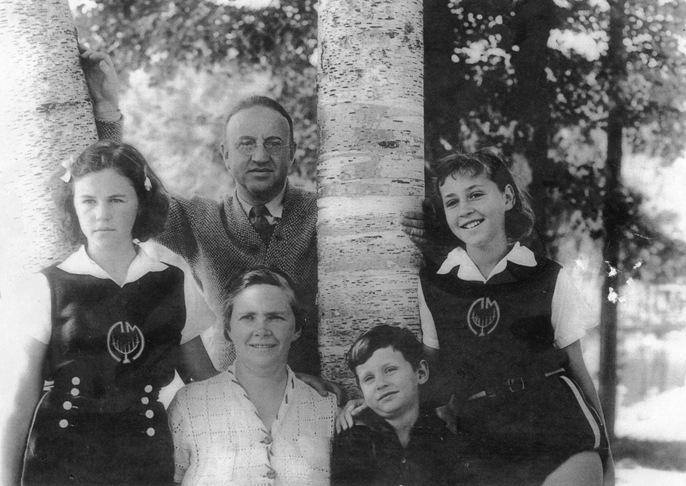
Camp Modin co-directors, Isaac & Libby Berskon, circa 1930s. Credit: Courtesy.
Modin was established to address issues of assimilation and the potential loss of Jewish identity in the children of first-generation American Jews. Jewish educators Albert and Bertha Schoolman proposed to colleagues Alexander and Julia Dushkin that they join them in establishing a private Jewish summer camp where children could learn Jewish values with their peers in a relaxed atmosphere. The Schoolmans and Dushkins joined with educators Isaac and Libbie Berkson and named the camp after the Israeli town of Modi’in, where the Maccabees of the Chanukah story lived.
‘My life’s work’
Modin started out with 45 boys on Lake George in central Maine and quickly expanded to 110 campers. In 1925, the nearby Camp Modin for Girls opened. Modin prided itself as a haven for both developing Jewish identities and escaping the threat of polio in the aftermath of World War I. It was also a place for establishing friendships and engaging in recreational activities in the great outdoors.
The camp has continued to grow and evolve since those days, with only a handful of directors over the course of its 100-year history. In 1942, the Dushkins and Schoolmans sold their stake in the camp to the Berkson family. The Berksons ran Modin until 1954, when longtime partner Sam Kadison purchased the camp and ran it until his death in 1979.
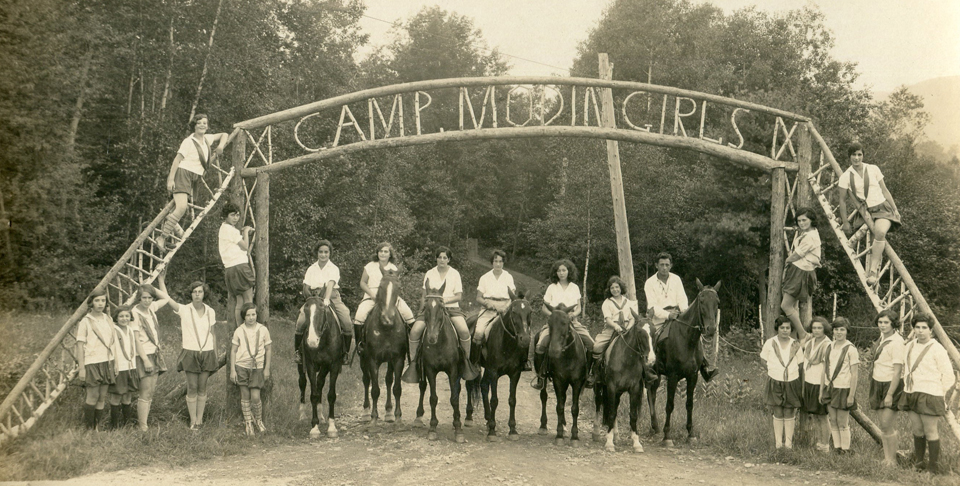
Camp Modin Girls’ Side circa 1930s. Credit: Courtesy.
Kadison’s niece, Amy Adler, and her husband, David Adler, owned the camp until David’s passing in 1992. Howard Salzberg, whose family’s roots go back to Modin’s founding in 1922, attended Modin for seven years starting out when he was a 9-year-old camper. He returned as a counselor, head counselor, and eventually, as the camp’s assistant director. In 1991, he hired future wife Lisa Wulkan, an elementary-school teacher, who would work as a counselor, head counselor, assistant director and director. Howard purchased the camp in November 1992, after David Adler’s death, and soon after moved it to a more modern site in Belgrade.
“I never went to summer camp myself as a child, and I thought it would be a nice experience working with children in the summer,” said Lisa. “I never thought it would become my life’s work.” She and her husband are parents to life-long Modin camper Jack.
‘A place for independence’
Modin usually has around 400 campers during the summer but trimmed that number down about 10 to 15 percent to limit bunk sizes due to coronavirus restrictions and protocols. The directors even acknowledged that they had to turn away hundreds of kids looking for spots when their camps closed for the summer.
This summer, the Salzbergs responded to what they saw was an important need in their community—offering dozens of campers the opportunity to celebrate “missed bar and bat mitzvahs” in person, surrounded by friends and beloved counselors (but not parents).
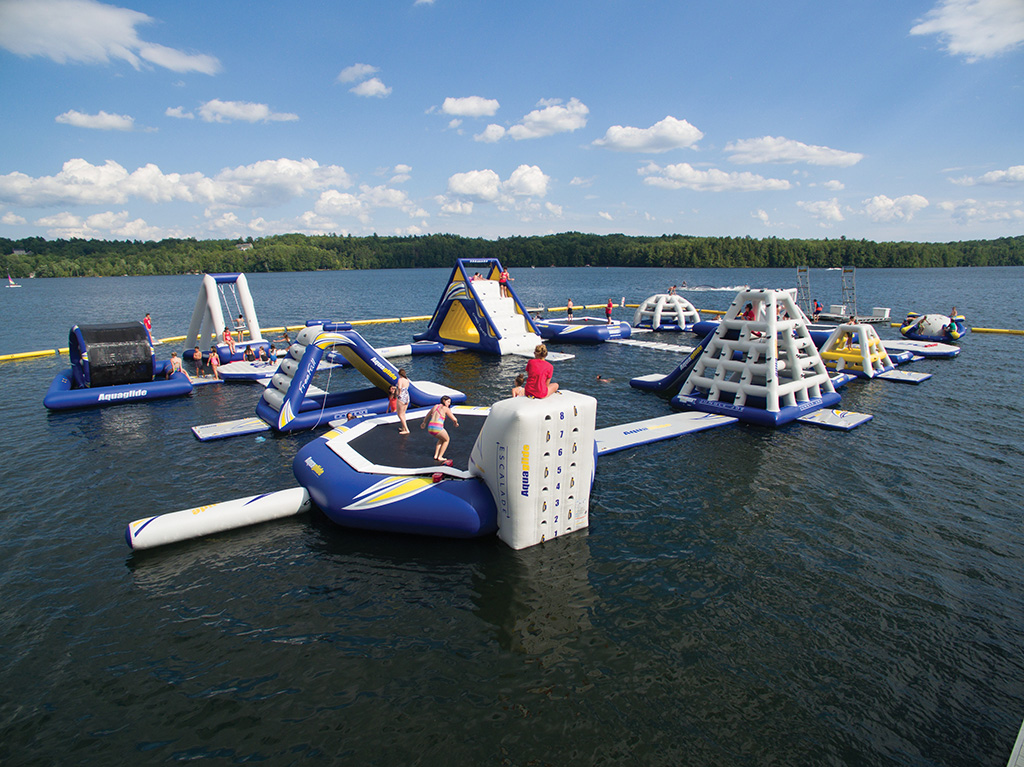
Camp Modin Water Park on Salmon Lake in Belgrade, Maine. Credit: Courtesy.
Campers took a break from action-packed days of wakeboarding, water skiing, fishing, zip-lining, working in the crafts studio, swinging on the trapeze and playing tennis to celebrate this important life-cycle event with friends. Some recited Torah blessings, while others read a few lines from the portions they would have read months earlier in their home synagogues. Proud parents and grandparents watched the event live-streamed. Howard had to run after our interview to help set up for the large, camp-wide b’nai mitzvah party.
One very happy parent texted him right after the bar mitzvah:
“I have no words to express how happy and emotional, special, beautiful this morning service was for me and my family. It was a mixture of feelings not just talking about the emotions of seeing my son and those kids up there to celebrate their bat/bar mitzvah, it was strong, magical and a feeling that we are indeed all together no matter what. You hard work and effort to have the camp opening in the middle of pandemic is priceless. What you are giving to my kids and to us it is not just another summer camp with their friends, you gave them hope, life, light in the end of the tunnel, discipline and most important when you believe and have faith you can make things happen no matter what. My children will be thankful for the rest of their life for being there this summer.”
Lisa Prosnitz, who lives in the Philadelphia suburbs with her husband, Dr. Robert Glen Prosnitz, was able to watch on Zoom as their son Andrew celebrated his bar mitzvah at camp. “When I watched it, the floodgates opened up,” she said, acknowledging that her family hadn’t fully processed the implications of the abrupt change of bar mitzvah plans in March. While they did manage to have a small, outdoors bar mitzvah service, the reception was canceled.
They couldn’t be happier that Andrew had the opportunity for both his bar mitzvah and to spend the summer with his friends. She added that she was grateful for the camp’s directors, saying “they worked so hard for camp to open and put so much thought in to how to keep our kids safe.”
Prosnitz knows about the Modin experience—she attended camp for three summers back in the mid-1980s. “Camp is a place to learn independence, courage and to get out of your comfort zone,” she offered. “Modin is a platform for this; it does it all!”
‘Every summer is a milestone’
What’s it like running a large summer camp during a global pandemic?
The good-natured Salzberg replied: “It is just another one in the life of camp. We have had to deal with the aftermath of World War II and 9/11, swine (flu) 09, H1N1, events in Israel … camp is a respite from the world.”
He noted that “the packaging changes from year to year, but what you are providing kids as the same as it was in 1922.”
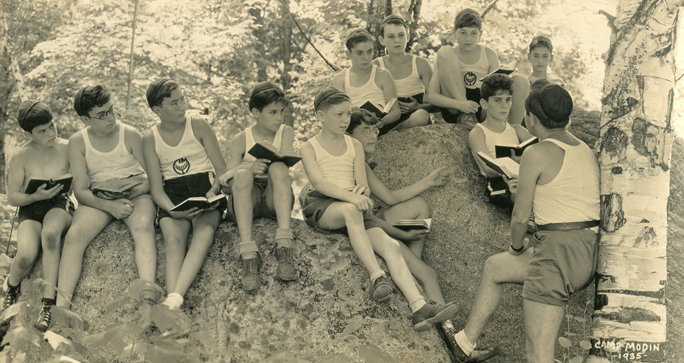
Camp Modin Boys’ Side, circa 1930s. Credit: Courtesy.
Salzberg and his leadership team have certainly seen changes over the years. He reported that parental expectations about both safety and programming have expanded over the years.
“Parents want greater supervision and accountability, and more programming,” he said, adding that “the spirit of camp is the same. Where else can you still have opening campfire, where campers proceed by torchlight down to the ‘friendship circle,’ color war, the canoe-paddle ceremony and campers eating family-style? The experience is very genuine, and the values are still the same—to grow as an individual, to be selfless, to be part of a community, to foster a sense of Jewish identify.”
Salzberg said he continues to delight in what each camper gets out of his or her experience. “They reach milestones. Every summer is a milestone,” he noted. “Milestones are ongoing—overcoming homesickness, passing the swim test; for some, it might take three years to put a pinky toe in the lake—that is a milestone.”
This summer, Modin has reached a double milestone: preparing to celebrate its centennial season and thriving in the face of a global pandemic.
Salzberg is pleased. “The kids seem so happy this summer,” he related. “They are not thinking about isolation or about the school year. They are happy to be alive again. They are just able to be kids.”
The post appeared first on .

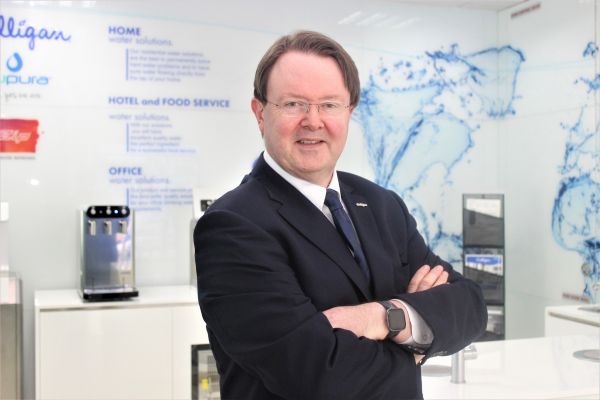


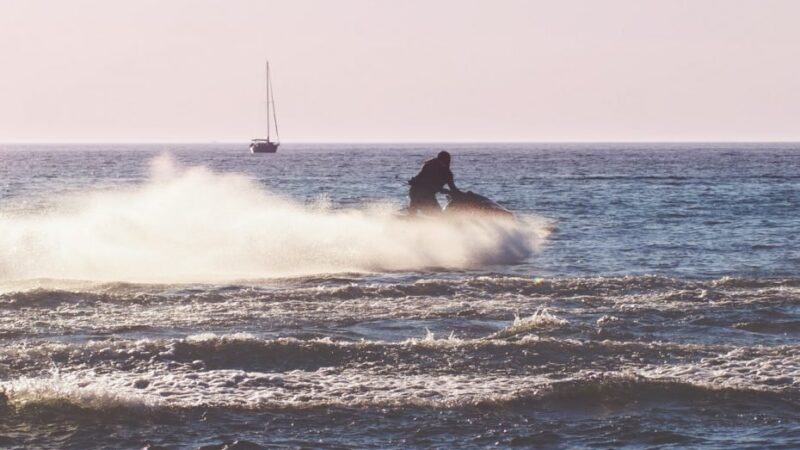
Recent Comments